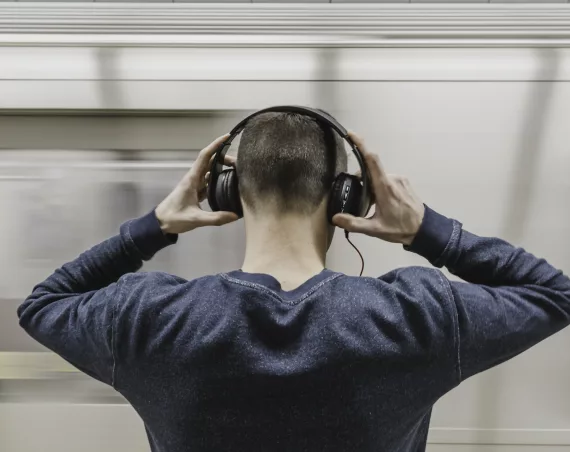
Languages, dialects and accents of the UK
Photo by Houcine Ncib on Unsplash
This episode is about the languages, dialects and accents of the UK.
Powered by RedCircle
Transcript
Hello and welcome to Learn English Vocabulary. My name is Jack and I’m making this podcast for you to learn or revise English vocabulary.
I’ve recently had a request for a podcast on the different languages and dialects and accents of the UK. This is something that I’m really interested in. I will have to work hard not to make this too long.
English Focus
Before I get to the topic of this podcast, I want to mention my other project which is called English Focus. I’ve been working on English Focus for the last year and I’m finally ready to open some courses. English Focus is an online language school that is based on speaking skills and developing fluency. It works in the same way as a traditional language school. I will present some language and set up a speaking task and then students will work in pairs to complete the task. I will give you lots of input on vocabulary and grammar and pronunciation and you will get to practise using the language. It’s going to be brilliant. I’ve been teaching and making online materials for a long time and I reckon this will be the best and quickest way to actually learn English.
The first courses are going to start on the 10th and 11th of October and then there will be a new course each week. At first they will be for Intermediate and Upper-Intermediate learners, but I’ll have more classes and some speaking clubs open as soon as I have enough learners. The courses will be 12 lessons long and at the moment, the course will cost £10 so that’s less than £1 per lesson. If you are interested, please visit EnglishFocus.com and complete the placement test to see if there’s a course for you.
Languages in the UK
OK, back to the different languages, dialects and accents of the UK. But where to start? There are 10 native languages spoken in the UK on the wikipedia page for Languages of the United Kingdom. 98% of people speak English, but then there’s Scots, Welsh, Cornish, Scots Gaelic, Irish, Ulster Scots and there are three further languages that are spoken by travelling communities: Angloromani, Shelta and Beurla Reagaird (which I’m afraid I’d never heard of and I’m not at all confident about how I’m pronouncing). I have lived in 8 towns and cities in different parts of the UK (mostly England) and I have not knowingly heard other languages spoken. If you can speak English, I believe that you will be able to communicate anywhere in the UK and if anyone pretends not to be able to understand you or pretends that they can’t speak English, I think you’re more likely to be dealing with an arsehole than having a language problem.
The Scots language and Scottish Standard English
That said, there are some really interesting features of the dialects across the UK, especially in Scotland and Northern Ireland where people often speak a dialect of Scots. The Scots language shares the same roots as English, but diverged about 700 years ago. If you visit Scotland, you may hear people speaking Scots or more likely, you’ll hear people speaking Scottish Standard English which is a dialect of English with lots of Scots words. So if you are visiting Scotland it’s a good idea to look up some lists of common Scots words and phrases.
The North – South divide
For learners, I think the main thing you need to be aware of is the pronunciation of hard and soft A sounds and hard U and softer U sounds. There is a divide somewhere in the middle of England. To the south of that line, people say things like: I’d like a glass of water. Did you watch the basketball on TV last night? North of the line, people say. I’d like a glass of water. Did you watch the basketball on TV last night? This a or a is quite a big difference. I was born in Yorkshire which is in the North of England/ When I was 8, I moved to the south east and I really didn’t like the way people said the long a: sounds. Don’t sit on the grass. Or that’s so funny, it makes me laugh. To me, the words were grass and laugh. I lived in the south of England from the age of 8 till I was 22 so my accent is now very much a southern accent and now I say laugh and grass and basketball.
The Smartest Giant in Town
There’s a children’s story called The Smartest Giant in Town by Julia Donaldson that I used to read to my sons. One time, my mum was visiting. She’s from the north of England I asked her to read a bedtime story to my son. Now, this story is a rhyme about a giant that buys lots of smart clothes and then gives them away to animals he meets that are in trouble. He meets a giraffe with a cold neck and gives away his tie. He sings: my tie is a scarf for a cold giraffe. Now when my mum read the story, she read my tie is a scarf for a cold giraffe. Now that doesn’t rhyme it’s scarf and giraffe, not scarf and giraffe.
The other sound is the u sound. In the north, people say up. In the south, people say up. The southern pronunciation is more neutral and closer to the schwa. The northern pronunciation makes you move your mouth more. Listen to these differences: Love / love, club club, hundred, hundred.
Accents are easy
My wife is not English. Her English is very good and she said that for a long time she’s been able to tell when people speak with an accent that doesn’t sound like Benedict Cumberbatch’s Sherlock Holmes or Emma Watson as Hermoine Granger in the Harry Potter films. I think the only time she’s had any problems with accents was when we visited Glasgow. For the most part she was delighted to hear the differences, but did get flustered when someone spoke to her directly and pretended that she didn’t speak English rather than admit it was the person’t accent.
So I don’t think that you need to worry that much about accents … unless you go to Glasgow. And even then, you will get used to the sounds that people use. However, some of the vocabulary used in regional dialects might be more of a challenge.
Listen to some clips
To give you a better idea about some different accents, I’ve got a couple of clips for you to listen to. For each clip, I’ll say the same words first and then you can listen to how they sound when someone from a different part of the UK says them.
RP – The Queen’s English / The King’s English
I’m going to start with RP or the Queen’s Englishor rather the King’s English. It’s going to take a while for me to remember to say the King’s English. Anyhow, I’m going to start with a clip from the series The Crown of the Queen giving a tour of Buckingham Palace. In this clip, the actress Claire Foy is playing the Queen and she says:
Shall we? Now, this is the picture gallery. This is my great great great great grandfather, George the third and he bought Buckingham House in 1761 for his wife, Queen Charlotte.
I think my accent is quite different to the Queen’s. I drop my ‘t’s at the end of great and bought and my vowel sounds are much lazier. Listen to the clip.
Shall we? Now, this is the picture gallery. This is my great great great great grandfather, George the third and he bought Buckingham House in 1761 for his wife, Queen Charlotte.
Frankie Boyle – Glasgow
OK now for something different. The next clip I want you to listen to is of a comedian from Glasgow called Frankie Boyle. In this clip, he says:
Do you remember years ago when they were making Braveheart everyone said it’s ridiculous, Mel Gibson playing a Scottish guy. That’s not going to be very convincing. And look at him now …
Listen out particularly for how Frankie Boyle says ‘ridiculous’. The ‘r’ and the ‘l’ are much harder in his accent.
Do you remember years ago when they were making Braveheart? Everyone said it’s ridiculous, Mel Gibson playing a Scottish guy. That’s not going to be very convincing. And look at him now …
The features of contracted speech that make English hard to learn, at least natural spoken English, are the same. I say dje for do you. Listen to the first line again.
Do you remember years ago when they were making Braveheart?
Alan Shearer – Newcastle (Geordie)
OK. Now, it’s time for a famous Geordie. This is a clip of an interview with Alan Shearer, the footballer. In this clip, he says.
My mind was mixed up. And then I got a call off Kevin Keegan to say look, can I have another half an hour with you and um… I said yes. So I went and had another talks with Kevin and I just thought, I’m going home.
Listen to the first line to how he says mixed up. Can you hear the difference between how I pronounce up and how Alan Shearer says it?
My mind was mixed up.
My mind was mixed up.
Listen to the whole clip and focus on the vowels. The geordie accent is often imitated by people really over emphasising the o sound. At the end, he says I’m going home.
My mind was mixed up. And then I got a call off Kevin Keegan to say look, can I have another half an hour with you and um… I said yes. So I went and had another talks with Kevin and I just thought, I’m going home.
Sir Paul McCartney (Liverpool)
OK. The last clip I want you to listen to is of one of the most famous people from England. This is a clip of Sir Paul McCartney who comes from Liverpool. I think he’s lived away from Liverpool for a long time so his accent is probably not as strong as it used to be.
In the clip he says:
I got a guitar when I was early teens and I learned a couple of chords. I learned a G and a G7, C and a F. And using those chords, I made up this little song called I lost my little girl.
Now listen to Sir Paul McCartney to hear the difference between my accent and the Liverpool accent.
I got a guitar when I was early teens and I learned a couple of chords. I learned a G and a G7, C and a F. And using those chords, I made up this little song called I lost my little girl.
Can you hear much of a difference between the way that I speak and the accents you’ve heard from Clair Foy as the Queen and Frankie Boyle, Alan Shearer and Sir Paul McCartney? The differences sound great to native speakers, but I’m not sure how great they will sound to you.
However, if you visit the UK and travel to Newcastle or Liverpool and have to check into a hotel or order some food in a restaurant, you will not have a problem. But if you go to a pub and try to listen in to conversations at the bar, I suspect you’ll have more of a problem. Most people will soften their accent when trying to sound professional, but it gets broader when they are relaxed; when they are talking to their friends and family.
I hope you have enjoyed this podcast and listening to the different accents. There are loads of videos on youtube on varieties of English across the UK. The better you can develop your listening skills, the more you will be able to hear these differences and once you can, you may enjoy the Northern Irish brogue or the lilting west country accent.
If you have enjoyed this podcast, please leave me a comment or a rating or a review. I love to hear from you and any comments or suggestions you have. So please visit LearnEnglishVocabulary.co.uk and say hello.
Thanks for listening.





5 Comments
Anastasiia
Wow! This is incredible and very interesting! Thank you for the podcast!
I’m going to move to Wales soon, really wondering how everything will sound like.
Jack
Thanks Anastasiia
The Welsh accent is very melodic. Look up Michael Sheen. https://www.theguardian.com/culture/video/2022/sep/28/thats-the-blood-of-wales-michael-sheen-gives-rousing-speech-to-welsh-football-team-video?CMP=Share_AndroidApp_Other he has a really good voice.
Antonio
Thanks Jack. Excellent podcast
Have you seen the movie?
” No country for old men”
Thanks. Blessings from Mexico
Jack
I have. I saw it quite a while ago. Would you like me to make a podcast about a scene from that film? Is there a character whose voice you like in particular?
Edward
Thank you, very much for wor incredible work!
I’m your new listener, and I spend with your podcast all weekend!
I saw, that you made reviews on the song, that was written in the comments, may be, you’ll be in interested of “White Lion – Cry for freedom” – I love this song very much and maybe it could be actually for this day’s.
I hope you fine, stay safe and take care your family !
From Ukraine with love and gratitude 🙏